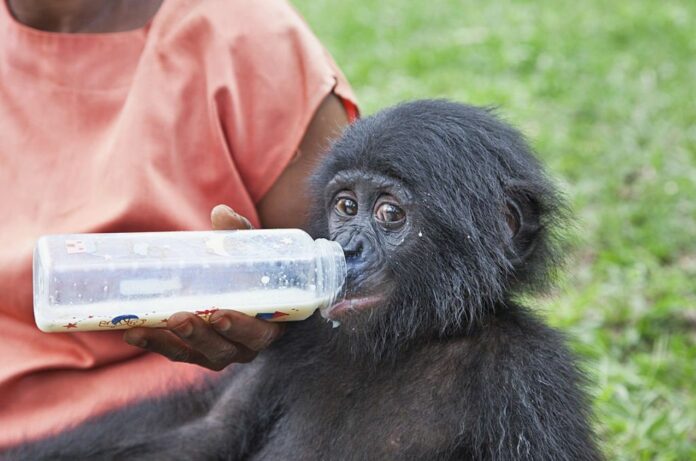Research published by the American Psychological Association finds that adolescent chimpanzees share similar risk-taking behaviors as human teens, but may be less impulsive.
The study delves into the longstanding debate of nature vs nurture, examining the factors that drive adolescent risk-taking behavior – whether it be environmental or biological.
“Adolescent chimpanzees,” according to lead author Alexandra Rosati, “are in some sense facing the same psychological tempest that human teens are.”
The findings of the new study reveal “that several key features of human adolescent psychology are also seen in our closest primate relatives.”
They performed two food-rewards experiments with 40 wild-born chimps in a refuge in the Republic of Congo. The chimpanzees willingly engaged in the activities in exchange for food rewards. The study was published in the Journal of Experimental Psychology: General online.
Chimpanzees may live to be 50 years old and reach adolescence between the ages of 8 and 15. Chimpanzees, like humans, experience fast changes in hormone levels throughout adolescence, begin building new attachments with peers, increase in aggressiveness, and compete for social position.
In the first experiment, adolescent and adult chimps were given a gambling challenge in which they had to select between two containers. One container was usually filled with peanuts, a snack that chimps like.
The other container contained either an unfavorable food — a slice of cucumber — or a preferred food — a slice of banana. The chimpanzees had the option of staying safe by choosing the peanuts or taking a chance on a prized banana at the cost of receiving an unappealing cucumber.
Moans, whimpers, shouts, beating on the table, and self-scratching were among the emotional responses and vocalizations of the chimpanzees that were captured on tape. Additionally, saliva samples were taken to measure hormone levels.
During multiple rounds of the test, adolescent chimps chose the riskier alternative more often than adult chimps, while adolescents and adults exhibited equal unpleasant responses to cucumber.
In the second experiment, which was based on the well-known “marshmallow test” with human children, chimpanzees were given the option of receiving one banana slice right away or delaying receiving three slices for a minute.
Adolescent and adult chimps made the same number of choices for the bigger delayed incentive. Human teenagers are more prone to acting on impulse than their elders, making them more likely to choose the option with the shorter wait time.
“Prior research indicates that chimpanzees are quite patient compared with other animals, and our study shows that their ability to delay gratification is already mature at a fairly young age, unlike in humans,” adds the author.
Adolescent chimpanzees, on the other hand, displayed increased dissatisfaction and tantrums during a one-minute delay for extra banana slices, compared to adult chimpanzees.
Similarly, risk-taking behavior is a common trait in both adolescent chimpanzees and humans, but impulsive behavior may be more prevalent in human teenagers, according to Rosati.
Image Credit: Getty
